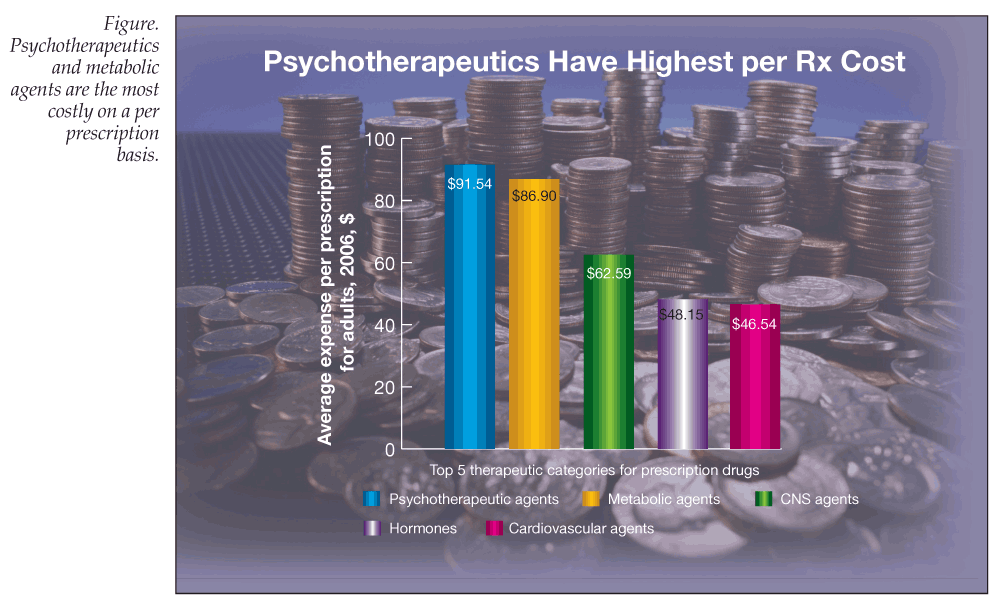- Clinical Technology
- Adult Immunization
- Hepatology
- Pediatric Immunization
- Screening
- Psychiatry
- Allergy
- Women's Health
- Cardiology
- Pediatrics
- Dermatology
- Endocrinology
- Pain Management
- Gastroenterology
- Infectious Disease
- Obesity Medicine
- Rheumatology
- Nephrology
- Neurology
- Pulmonology
Metabolic Agents Lead Drug Expenditures
Adults in the United States spent more on medications for diabetes and high cholesterol and other metabolic disorders than on any other class of medications in 2006. Expenditures for metabolic agents totaled $38.1 billion, or 18.3% of total outpatient drug expenditures for noninstitutionalized adults 18 years and older. In all, outpatient drug spending totaled $208.1 billion in 2006. Expenditures for the top 5 therapeutic classes accounted for $130.8 billion, or 62.9% of total expenditures. Findings are from the ongoing Medical Expenditure Panel Survey conducted by the Agency for Healthcare Research and Quality.
Adults in the United States spent more on medications for diabetes and high cholesterol and other metabolic disorders than on any other class of medications in 2006. Expenditures for metabolic agents totaled $38.1 billion, or 18.3% of total outpatient drug expenditures for noninstitutionalized adults 18 years and older. In all, outpatient drug spending totaled $208.1 billion in 2006. Expenditures for the top 5 therapeutic classes accounted for $130.8 billion, or 62.9% of total expenditures. Findings are from the ongoing Medical Expenditure Panel Survey conducted by the Agency for Healthcare Research and Quality.
After metabolic agents, the top-selling categories were cardiovascular agents, $33.1 billion, or 16%; CNS drugs (including analgesics), $28.2 billion, or 13.6%; psychotherapeutic agents, $17.5 billion, or 8.4%; and hormones, $14.0 billion, or 6.7% (Cover Figure). (Metabolic agents include diabetic supplies and equipment and also insulin, which in this survey is classified as a metabolic agent rather than as a hormone.)
Medications dispensed most often were CNS drugs. These were purchased by 45.5% of persons who had a prescription drug expense. Cardiovascular agents were purchased by 38.9%, hormones by 29.7%, and metabolic agents by 28.9%, while psychotherapeutic agents were purchased by 16.9%.

The most costly drugs were psychotherapeutic agents, averaging $91.54 per prescription, followed by metabolic drugs at $86.90 per prescription; CNS agents, $62.59; and hormones, $48.15 (Figure). Cardiovascular drugs were the least costly, averaging $46.54 per prescription.
The Medical Expenditure Panel Survey includes data on 332,000 persons who are interviewed several times over a 2-year period. Excluded are OTC drugs and prescription drugs administered in a physician’s office, hospital, or other inpatient setting.
Data for the Cover Figure and in the ““Trend of the Month” are from the Center for Financing, Access, and Cost Trends, Agency for Healthcare Research and Quality, household component of the Medical Expenditure Panel Survey, 2006. More information is available athttp://www.meps.ahrq.gov/mepsweb/data_files/publications/st232/stat232.pdf.
Oral PCSK9 Inhibitor Enlicitide Meets All End Points in Phase 3 Hypercholesterolemia Trial
September 2nd 2025At week 24, patients receiving once-daily enlicitide demonstrated statistically significant and clinically meaningful reductions in low-density lipoprotein cholesterol compared with placebo.
